Nearly €245 million awarded to Horizon 2020 transport projects
INEA has signed grant agreements with 39 projects selected for funding under two Horizon 2020 calls – Mobility for Growth and Automated Road Transport respectively. They will receive a total of €243.8 million.
Most of the funding – some €200 million – will go to 36 projects selected under Mobility for Growth.
The remaining amount will go to three projects under Automated Road Transport.
The projects are expected to use research and innovation on equipment and systems for vehicles, aircraft and maritime vessels that will make them smarter, cleaner, safer, and more automated.
Projects will also focus on research on road users’ safety, sustainable mobility in urban areas and “smart electric mobility” in cities, improvement of the logistics systems’ performance, and resilience and optimisation of transport infrastructure.
They are expected to start their activities by 1 September 2018 at the latest.
Project examples:
Enabling safe multi-brand truck platooning for Europe

The main goal of the ENSEMBLE project is to pave the way for the adoption of multi-brand truck platooning in Europe to improve fuel economy, traffic safety and throughput. This will be demonstrated by driving six differently branded trucks (DAF, DAIMLER, IVECO, MAN, SCANIA, VOLVO) in one or more platoon(s) under real world traffic conditions across national borders.
The following objectives are defined: a) Achieve safe platooning for trucks of different brands, b) work towards the standardisation and achieve interoperable platooning, and c) real-life platooning showing a multi-brand platoon in real traffic conditions.
ENSEMBLE brings the key actors for deployment together which are all major truck OEMs (98% of the market) supported by other organisations, key stakeholder groups and relevant suppliers. The expected impact is on a Europe wide deployment of platooning with multi-brand vehicles in real, mixed traffic conditions.
The project pursues making transparent the economic, societal and environmental impact of decisions of platoon forming and dissolving. It also aims to modernise the transport system by finding an optimal balance between fuel consumption, emission level, travel times, and impact on highway traffic flow. This, in turn, will result in reduced impacts on climate change, air pollution, noise, health and accidents.
Project title: ENabling SafE Multi-Brand pLatooning for Europe (ENSEMBLE)
Duration: 36 months (01/06/2018 – 31/05/2021)
Budget: €26 million
EC funding: €20 million
Project Coordinator: TNO
Hierarchical multifunctional composites for the aviation industry

The HARVEST project will develop structural composites (based on innovative thermoset 3R – repair, recycle and reprocess), autonomous electric integrated system for health monitoring and a wireless data transmission system. The innovative materials will be manufactured in purposefully developed pilot lines aiming to cut production time and costs.
The proposed technologies will be finally integrated in two aircraft demonstrators, testing elements with different temperatures and in quick heat dissipation conditions.
Project title: Hierarchical multifunctional composites with thermoelectrically powered autonomous structural health monitoring for the aviation industry (HARVEST)
Duration: 36 months (01/09/2018 – 31/08/2021)
Budget: €4 million
EC funding: €4 million
Project Coordinator: 11 partners from 6 countries coordinated by University of Ioannina (Greece)
Charging infrastructure for electric vehicles

The GreenCharge project will empower cities and municipalities to make the transition to zero emissions and sustainable mobility. It will use innovative business models and technologies, and will provide guidelines for cost efficient and successful deployment and operation of charging infrastructure for electric vehicles.
Inspired by ideas from the sharing economy, the business models will focus on enabling the mutualisation of excess capacity of private RES, private charging facilities and the batteries of parked electric vehicles. Pilots will be carried out in Barcelona, Bremen and Oslo to demonstrate and evaluate the proposed approach.
Project title: GREENCHARGE
Duration: 36 months (01/09/2018 – 31/08/2021)
Budget: approx. €5.7 million
EC funding: €5 million
Project Coordinator: 16 partners from 6 countries coordinated by SINTEF AS (Norway)
Enabling the transferability of cycling innovations

The HANDSHAKE project supports the effective take up of the integrated cycling solutions successfully developed by Amsterdam, Copenhagen and Munich, Cycling Capitals and world-renowned cycling front runners, to 10 highly committed Future Cycling Capitals: Bordeaux Metropole, Bruges, Cadiz, Dublin, Helsinki, Krakow, Greater Manchester, Riga, Rome and Turin.
The project strategic objectives are: to inspire the creation or refinement of holistic cycling visions and concrete transfer approaches; to foster the adoption of a multidisciplinary planning culture to consolidate future cycling policies and investments; to allow cycling to become a key element of urban transport; to improve cycling modal share and safety; to leverage the potential of cycling as a critical congestion relief tool; to leverage cycling to improve public health; to foster economic growth.
HANDSHAKE expects to improve cycling attractiveness by +52% and competitiveness by 17%, shift ca. 60.000 people to cycling with +34% in frequency of cycling use, traffic levels lowered by 6,34%,and CO2 savings of -3.706.000 kg CO2/year.
Project title: Enabling the transferability of cycling innovations and assessment of its implications (HANDSHAKE)
Duration: 42 months (01/09/2018 – 28/02/2022)
Budget: approx. €5 million
EC funding: €4.8 million
Project Coordinator: 19 partners from 12 countries coordinated by ISINNOVA (Italy)
How were the projects selected for EU funding?
The submitted proposals were evaluated by external experts drawn from the European Commission’s independent expert database. Grant agreements were signed with the successful applicants within eight months of the submission deadline.
How will the projects be managed?
The projects are each implemented by a consortium of European partners. INEA will monitor their progress throughout the entire project life-cycle.
Overall, €12.2 billion has been earmarked for transport and energy research in Horizon 2020, the main EU’s funding programme for the 2014-2020 period. €5.3 billion of this amount will be managed by INEA resulting in approximately 800 projects.
Source: INEA

